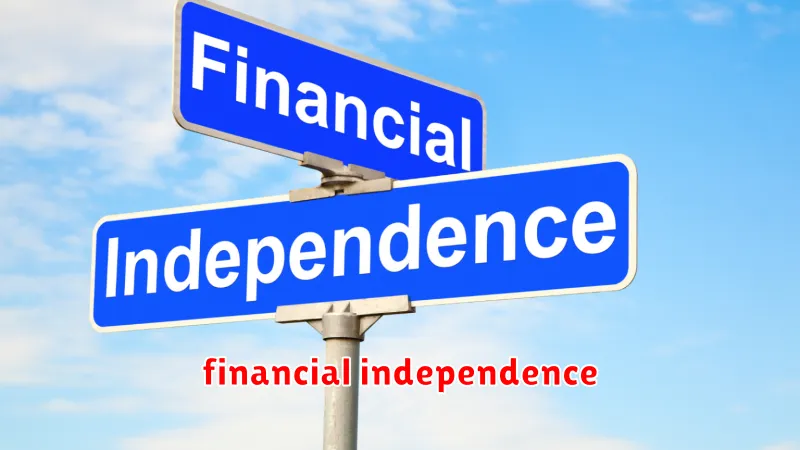Are you tired of living paycheck to paycheck, feeling trapped in a job you don’t enjoy? Do you dream of a life where you have the freedom to pursue your passions, travel the world, and spend more time with loved ones? Achieving financial independence is the key to unlocking this dream. It’s not just about having a lot of money, it’s about having the financial freedom to live life on your own terms. This article will guide you through the steps necessary to plan for financial independence and finally achieve freedom from work.
The path to financial freedom can seem daunting, but it’s a journey worth taking. With careful planning, disciplined saving, and strategic investing, you can create a secure financial future that allows you to live life on your own terms. Whether you’re looking to retire early, become a digital nomad, or simply have the peace of mind knowing you’re financially secure, this guide will provide you with the tools and knowledge you need to succeed. Let’s explore the steps to achieve financial independence and start living a life truly your own.
What is Financial Independence?
Financial independence is the state of having enough passive income to cover your living expenses without needing to work a traditional job. This means you have complete control over your time and can choose how you spend your days. Achieving financial independence is a significant life goal that offers freedom from the constraints of employment and allows you to pursue your passions and interests.
There are various approaches to achieving financial independence, such as investing in stocks, real estate, or starting a business. The key is to build a portfolio of assets that generate passive income, such as dividends from stocks, rental income from real estate, or revenue from a passive business. Once your passive income exceeds your expenses, you have achieved financial independence.
Financial independence is not just about money; it’s about having the freedom to live life on your terms. It allows you to prioritize your health, pursue hobbies, travel, or simply enjoy more time with loved ones. Achieving financial independence requires planning, discipline, and a long-term mindset, but the rewards are immense.
The Benefits of Financial Independence
Financial independence is a state of having enough financial resources to live comfortably without needing to work for income. This can be a major life goal for many people, as it offers a range of benefits that can greatly improve your quality of life. Here are some of the key benefits of financial independence:
Freedom and Flexibility: One of the most significant benefits of financial independence is the freedom and flexibility it provides. You can choose to work when and how you want, or not at all, if you choose. This allows you to pursue your passions, travel, spend time with loved ones, or simply relax and enjoy life.
Reduced Stress: Money worries are a major source of stress for many people. Financial independence can greatly reduce this stress, as you no longer have to worry about making ends meet or struggling to pay bills. This can lead to a happier and healthier life.
Increased Time and Control: When you’re no longer tied down to a job, you have more time and control over your life. You can choose how you want to spend your days, whether that’s pursuing hobbies, starting a business, or simply enjoying more leisure time.
Improved Health: Studies have shown that financial stress can have a negative impact on both physical and mental health. By achieving financial independence, you can significantly reduce this stress, leading to a healthier and happier life.
Security and Peace of Mind: Financial independence provides a sense of security and peace of mind, knowing that you have a safety net in place. You can face unexpected challenges or emergencies without financial hardship, allowing you to navigate life with greater confidence.
How to Calculate Your Financial Independence Number
Financial independence is the state of having enough passive income to cover your expenses without relying on a job. This can be a liberating goal, but it requires careful planning and a clear understanding of your financial needs. One key element in achieving financial independence is calculating your financial independence number. This number represents the amount of money you need invested to generate enough passive income to cover your annual expenses. Here’s how to calculate it:
1. Determine Your Annual Expenses: Start by tracking your spending for a year to get a realistic picture of your annual expenses. This includes housing, food, transportation, healthcare, and any other regular expenses.
2. Choose a Safe Withdrawal Rate: This is the percentage of your investment portfolio you can withdraw annually without depleting it over time. A common and conservative rate is 4%, meaning you can withdraw 4% of your portfolio each year without jeopardizing your long-term financial security. Some people may opt for a lower rate, like 3%, depending on their risk tolerance and desired longevity of their investments.
3. Calculate Your Financial Independence Number: Divide your annual expenses by your chosen safe withdrawal rate. For example, if your annual expenses are $50,000 and you choose a 4% withdrawal rate, your financial independence number would be $1,250,000 ($50,000 / 0.04 = $1,250,000).
4. Adjust for Inflation: As time goes on, inflation will erode the purchasing power of your money. Consider factoring in an inflation rate when calculating your financial independence number. You can use an inflation calculator to estimate how much your expenses will increase over time.
It’s important to remember that this calculation is just an estimate and may need adjustments as your life circumstances change. Regularly reviewing your financial independence number and adjusting it as needed will help you stay on track to achieving your goals.
The Role of Saving and Investing in Financial Independence
Financial independence, the ability to live comfortably without relying on a job for income, is a goal many strive for. Achieving this freedom requires a solid financial plan, and saving and investing play a crucial role.
Saving is the foundation of financial independence. It allows you to accumulate funds that can be used to cover expenses, pay off debt, and build an emergency fund. By consistently setting aside a portion of your income, you create a safety net and gain control over your finances.
Investing takes your savings to the next level. By investing in assets like stocks, bonds, or real estate, you can potentially grow your wealth over time. This growth can provide a steady stream of passive income, ultimately leading to financial independence. Investing also helps protect your savings from inflation, ensuring your purchasing power remains intact.
The combination of saving and investing allows you to build a strong financial foundation. It’s crucial to develop a financial plan that outlines your saving and investing goals, considers your risk tolerance, and sets realistic timelines. A well-designed plan can guide your journey towards financial independence, providing peace of mind and the freedom to pursue your passions.
Tips for Reducing Expenses to Achieve Financial Independence
Achieving financial independence is a journey that requires careful planning and discipline. One of the most crucial aspects of this journey is reducing unnecessary expenses. By taking control of your spending, you can free up more money to invest and grow your wealth. Here are some tips to help you reduce expenses and accelerate your path to financial independence.
Track Your Spending: The first step to reducing expenses is to understand where your money is going. Track your spending for a month or two to identify areas where you can cut back. There are many budgeting apps and online tools available to assist you.
Challenge Your Habits: Take a close look at your daily routines and spending habits. Are there any unnecessary subscriptions, memberships, or services you can cancel? Do you frequently eat out or indulge in expensive hobbies?
Cook More Meals at Home: Eating out can be a significant expense. Cooking more meals at home can save you money and allow you to control the quality and ingredients of your food.
Negotiate Your Bills: Don’t be afraid to negotiate your monthly bills, such as phone, internet, or cable services. You may be surprised at the savings you can achieve by calling and asking for a better deal.
Consider Downsizing Your Living Space: If you are paying a hefty mortgage or rent, consider downsizing to a smaller and more affordable living space. This can free up a substantial amount of money each month.
Cut Back on Non-Essential Spending: Entertainment, travel, and luxury goods are often considered non-essential expenses. Evaluate your spending in these areas and prioritize experiences that bring you genuine joy and value.
Shop Smart and Look for Discounts: Take advantage of discounts, coupons, and sales when making purchases. Comparison shop for products and services to find the best deals.
Embrace a Minimalist Lifestyle: Minimalism is about living with less and focusing on experiences and relationships rather than material possessions. Adopting a minimalist lifestyle can reduce expenses and free up more resources for investing in your future.
By implementing these tips, you can significantly reduce your expenses and build a solid financial foundation. Remember that achieving financial independence is a marathon, not a sprint. It requires patience, discipline, and a commitment to making smart financial decisions.
Common Mistakes to Avoid in Financial Independence Planning
Achieving financial independence is a significant goal that requires careful planning and execution. While the journey can be rewarding, it’s crucial to avoid common mistakes that could derail your progress. This article outlines some critical pitfalls to watch out for.
One of the most prevalent mistakes is underestimating expenses. Many individuals underestimate their living costs, leading to a flawed budget and a delayed path to financial independence. It’s essential to accurately track and categorize spending to gain a realistic view of your expenses.
Another significant error is failing to consider inflation. The purchasing power of money diminishes over time due to inflation. Therefore, neglecting to factor in inflation when calculating your financial independence target can lead to a shortfall in funds.
Setting unrealistic expectations is a common mistake. It’s important to set attainable goals and avoid unrealistic timelines. Overly aggressive targets can lead to discouragement and frustration, hindering your motivation.
Furthermore, not having a plan or a clear roadmap can be detrimental. Without a well-defined plan, your journey to financial independence may lack direction and purpose. This can make it challenging to stay motivated and track your progress.
Lastly, lack of diversification can put your financial independence at risk. Diversifying your investments across various asset classes helps mitigate risk and potentially enhance returns. This is crucial for ensuring the stability and sustainability of your financial independence.
How to Create a Financial Independence Plan
Financial independence is the state of having enough wealth to live comfortably without relying on employment income. It’s a goal that many people strive for, but it can seem daunting to achieve. A financial independence plan is a roadmap that outlines your financial goals and the steps you’ll take to reach them.
The first step in creating a financial independence plan is to determine your financial goals. How much money do you need to live comfortably without working? What kind of lifestyle do you want to have? Once you know your goals, you can start to make a plan to achieve them.
Next, you need to assess your current financial situation. This includes tracking your income, expenses, and assets. You can use a budgeting app or spreadsheet to track your spending and identify areas where you can save money.
Once you have a clear understanding of your financial goals and current situation, you can start to create a financial independence plan. This plan should include:
- Saving and investing goals: How much will you save each month? What types of investments will you use?
- Retirement planning: When do you plan to retire? How much money will you need in retirement?
- Debt management: How will you pay off any existing debt?
- Estate planning: How will you manage your assets after you pass away?
It’s important to regularly review and adjust your plan as your financial situation changes. You can also seek professional advice from a financial advisor to help you create and implement a plan that meets your specific needs.
The Importance of Passive Income in Financial Independence
Financial independence is a state where you have enough passive income to cover your living expenses, giving you the freedom to choose how you spend your time. While a robust investment portfolio and savings are crucial, passive income plays a pivotal role in achieving this goal. Passive income is income generated from assets or investments that require minimal effort to maintain, allowing you to earn money without actively working.
The Importance of Passive Income lies in its ability to provide a consistent and reliable stream of revenue, independent of your active employment. This financial cushion offers several benefits:
- Financial Security: Passive income provides a safety net, safeguarding you against job loss or unexpected financial challenges.
- Freedom and Flexibility: Having passive income allows you to pursue your passions, travel, or simply enjoy more free time without worrying about finances.
- Early Retirement: Building a strong passive income stream can enable you to retire earlier and enjoy the fruits of your labor.
- Financial Growth: Passive income can be reinvested to grow your wealth and accelerate your journey towards financial independence.
By incorporating passive income streams into your financial plan, you can create a more sustainable and resilient financial future. It’s a crucial element in achieving financial independence and living a life on your own terms.
The Impact of Taxes on Financial Independence
Taxes are a significant factor to consider when planning for financial independence. While taxes are a necessary part of society, they can eat into your savings and investment returns, impacting your ability to achieve financial freedom. Understanding the various taxes you’ll face and how they affect your financial independence journey is crucial.
Income taxes are levied on your earnings from various sources, including salaries, investments, and business ventures. These taxes can significantly impact your overall income, reducing the amount available for savings and investment.
Capital gains taxes apply to profits earned from selling assets such as stocks, bonds, or real estate. These taxes can be a major deterrent to investing, especially for long-term investments, as they reduce your potential returns.
Property taxes are levied on your home, land, and other real estate holdings. While these taxes may seem small, they can add up over time, affecting your overall financial picture.
Estate taxes, also known as inheritance taxes, are levied on the value of your assets when you pass away. These taxes can be a significant burden on your heirs, potentially reducing the inheritance they receive.
To minimize the impact of taxes on your journey to financial independence, consider the following strategies:
- Invest in tax-advantaged accounts like 401(k)s, IRAs, and Roth IRAs. These accounts offer tax deferral or tax-free growth, allowing you to accumulate wealth more effectively.
- Take advantage of tax deductions and credits for charitable donations, homeownership, and other expenses. By maximizing these deductions, you can reduce your tax liability and increase your savings.
- Consult with a financial advisor who can provide personalized advice and guidance on tax-efficient investing strategies.
By understanding the impact of taxes and incorporating tax-efficient strategies into your financial plan, you can significantly increase your chances of achieving financial independence and securing your future.
The Future of Financial Independence Planning
The concept of financial independence, achieving freedom from work through careful financial planning, is gaining traction. As the world evolves, traditional career paths are becoming less predictable and the desire for flexibility and control over one’s time is rising. The future of financial independence planning will likely be shaped by these emerging trends.
Automation and Artificial Intelligence (AI): Advancements in AI will likely automate many tasks, potentially impacting traditional employment. This will necessitate a shift towards entrepreneurial pursuits or careers that leverage human skills, creativity, and emotional intelligence. Financial independence planning will need to adapt to this evolving job market, helping individuals identify and capitalize on future opportunities.
Gig Economy and Remote Work: The rise of the gig economy and remote work offers greater flexibility and control over one’s schedule, making it easier for individuals to pursue financial independence. Financial planning strategies will need to accommodate this shift, accounting for income fluctuations and the need for financial discipline in managing self-employment income.
Increased Longevity: As people live longer, the traditional retirement model may become unsustainable. Financial planning will need to account for longer lifespans and potential income streams beyond traditional retirement, including passive income strategies and alternative investment options.
Personalization and Technology: The future of financial independence planning will be heavily reliant on technology. Personalized financial planning tools and platforms will empower individuals to take control of their financial future. These tools will provide real-time insights, automate investment decisions, and offer customized financial guidance.
In conclusion, the future of financial independence planning will be characterized by adaptability, innovation, and personalization. Individuals will need to embrace evolving trends, diversify their income streams, and leverage technology to secure their financial future. By proactively adapting to these changes, individuals can pave the way for a fulfilling and financially independent life.




